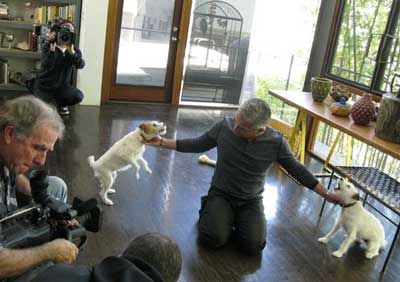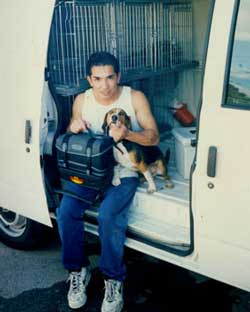
It's really hard to sit across from Cesar Millan -- the man who claims to know our dogs' inner lives, who communicates with them in ways we can't -- and refrain from asking the question that's uppermost in mind: "Can you tell me why my dog -- ?"
In my case, I wanted Cesar's opinion as to why my rescued Deer Chihuahua, Tino Martinez -- so mild-mannered and friendly that he's the only one of his breed to certify as a therapy dog -- had suddenly become a no-rhyme-or-reason biter. I attributed his changed personality to severe dental surgery that cost him 15 teeth and two days in the hospital. But now I had the renowned dog expert's undivided attention.
Instead, I did the professional thing. I punted by asking, "Is it possible for you to go anywhere without people stopping you for dog advice?" After all, we were at a Hollywood club to talk about Millan's show, not my issues with an unpredictable Chihuahua.
Apparently, my impulse to pump The Dog Whisperer for information is a familiar one to the trainer who's turned the phrases "pack leader" and "calm submissive state" into mantras. Millan says it doesn't matter where he is or what he's doing, even while he's eating in restaurants, but when people interrupt him, their question usually begins with: "I'm sorry to bother you, this'll just take 30 seconds." Millan feels bad he has to tell them there is no "30-second cure" for what ails their pets. "I can't really help them because the dog's not there. The human tells you the story," Millan explains, but "the dog tells you the truth."
His millions of fans think Millan has been telling the truth for years about their beloved but sometimes mystifying four-legged family members. On Saturday (Jan. 7 at 8 p.m. ET), when The Dog Whisperer With Cesar Millan switches channels to NatGeo Wild to start its eighth season, the show will also mark its 150th episode.

For Millan, the biggest difference between the first show he ever shot and the 150th is the relationship between him, his producers, his sound team and his camera crew. "We're in sync," he says. To him, the purpose of Dog Whisperer has always been "to help dogs. The TV show is secondary." Now, his crew knows when they have the piece, how to bring the story out without rushing it, and how to behave when shooting with Millan and the dogs who need his help. "The dog knows how they [the people in the room with me] feel. They know if you had a fight with your wife. The crew members do not have to be dog lovers, just respectful humans."
Millan never meets with the clients and their dogs before the shoot. That, he says, would make the show "lose its authenticity." And confronting aggressive animals has never been a problem for Millan. "To jump the border, you have to be confident and brave," he says, explaining how he first came to the United States, determined to succeed and knowing from the time he was a teenager in Mexico that he was going to be a world-famous dog trainer. When shooting, he never wants to lose his empathy, but, he says, "you still have to find the fastest and best way to get to the point. It is about maintaining the essence of what I do but respecting the rules of television."

The more successful he has become, the more vocal his critics, and Millan knows his methods are not universally embraced. Other experts in the field have criticized Cesar's way as punitive, some going as far as to say he has set dog-training back years. His critics' focus, he says, "is on technique." Millan prefers to talk less about "dominance . . . they don't like that word, but it's semantics. Perhaps they have never experienced being with a pack of dogs." Instead, he uses the word "principles," and suggests that those who think a dog can be trained simply with affection are like "parents who don't set boundaries. There can be harmony between a dog and his owner, but the human must be the leader. For a knowledgeable dog lover, knowledge is power." Seeing the issues from the dog's point of view, and then providing the tools for dogs and their people to live in harmony has been Millan's metier, and for many dog lovers, their salvation.
Before Millan leaves, I have to know what The Dog Whisperer might think about dog psychics. He looks bemused when I tell him a dear friend and believer provided me with a gift certificate so I could find out what my dog was thinking. (Turns out, when the communicator asked Tino if he wanted to have surgery for his bum knee, he said, no thanks, he was doing just fine, which was about the time I thought maybe I was in the wrong line of work.)
Millan didn't come down on either side of the psychic's viability, but it seemed to me that The Dog Whisperer and she did have one important thing in common. Though Millan's understanding of dogs and their instinctual behavior might be more preternatural than psychic, he also has made a career out of what we would all like to do: talk to our animals, and have them finally understand us.